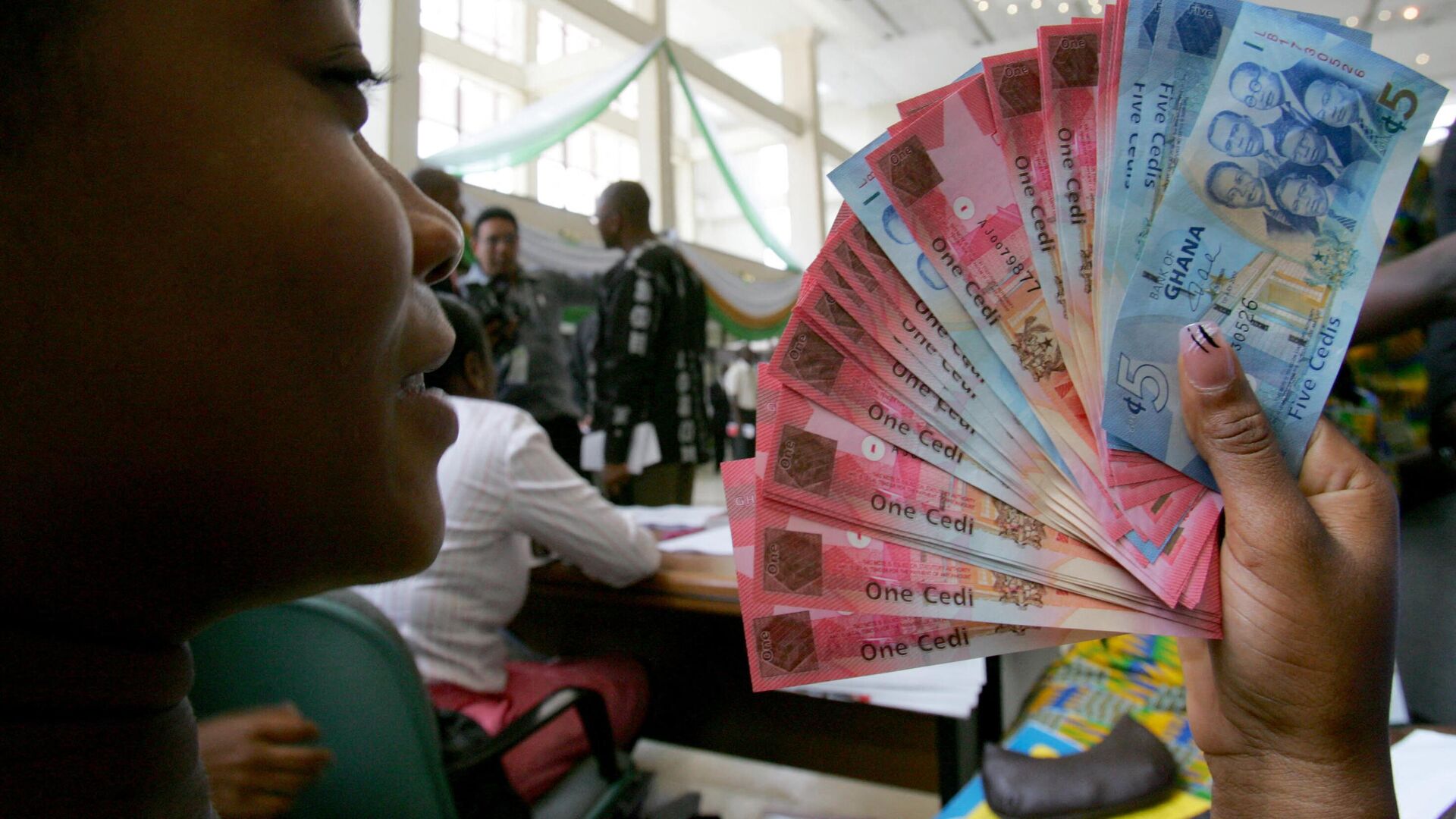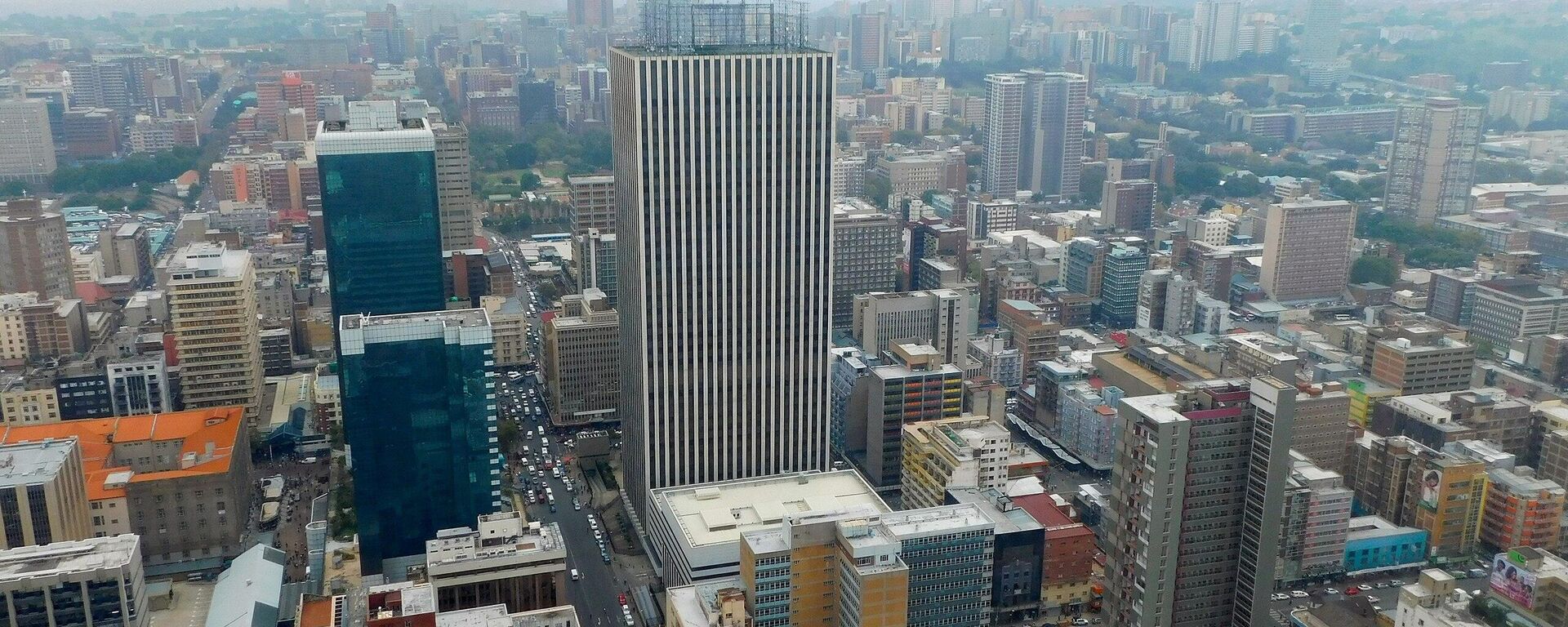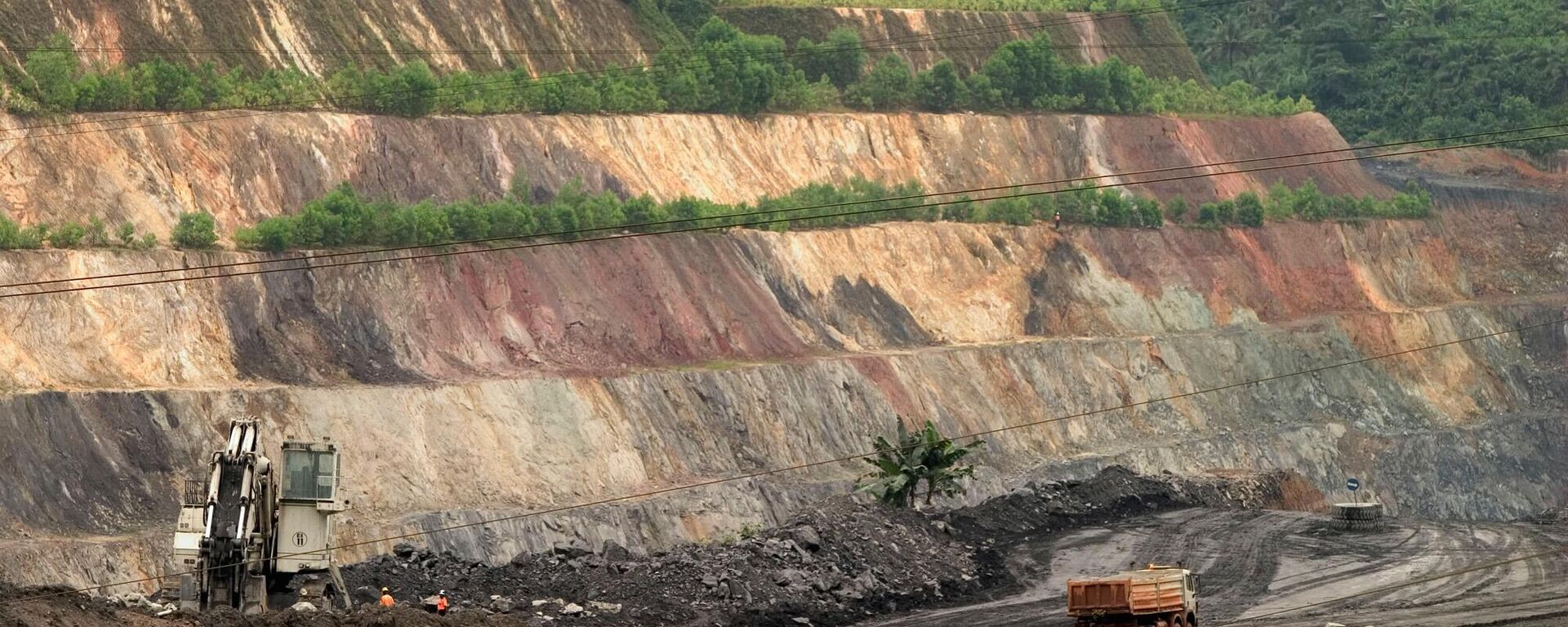https://en.sputniknews.africa/20230518/ghana-secures-3-billion-imf-package-to-aid-economic-recovery-1059326933.html
Ghana Secures $3 Billion IMF Package to Aid Economic Recovery
Ghana Secures $3 Billion IMF Package to Aid Economic Recovery
Sputnik Africa
The International Monetary Fund has approved a $3 billion bailout package for Ghana over the next three years, including an immediate disbursement of $600 million, to support the West African nation's struggling economy.
2023-05-18T16:07+0200
2023-05-18T16:07+0200
2023-08-03T10:44+0200
sub-saharan africa
west africa
ghana
international monetary fund (imf)
loan
economy
https://cdn1.img.sputniknews.africa/img/07e7/05/12/1059329666_0:392:2944:2048_1920x0_80_0_0_6ea976e189ed69366150e5457348ef29.jpg
The International Monetary Fund (IMF) has approved a $3 billion bailout package for Ghana over the next three years, including an immediate disbursement of SDR 451.4 million (about $600 million), to support the West African nation's struggling economy.The IMF package is aimed at boosting Ghana's foreign reserves, which have plummeted by nearly 50 percent since August 2021 as Ghana's central bank spent its foreign currency to defend the country's local currency, the cedi, which has become the world's best performer against the US dollar over the past six months, as investors speculated that the country was set to secure such funding.Meanwhile, the IMF said the Ghanaian authorities had taken "bold steps" to secure the loan, including accelerating fiscal adjustment and launching a major debt restructuring. However, this loan is not without its critics, as previous IMF loans, which are tied to austerity measures and structural reform requirements, have faced some opposition due to their perceived negative impact on ordinary Ghanaians. Ghana is therefore expected to make tough fiscal decisions, including increasing taxes, in order to receive the other parts of the package, including a second $600 million disbursement in November and other equal installments of about $350 million every six months.The IMF added that the Ghanaian government should also pursue "appropriately tight monetary and flexible exchange rate policies" to help "bring inflation back to single digits and rebuild international reserves."While the IMF package is a big relief for Ghana’s struggling economy, the country still has a long way to go to restore its financial stability. Ghana has taken a bold step by negotiating with China as part of its debt restructuring.In recent years, the IMF has faced competition from China as African nations reject its austerity demands, experts say. Unlike the IMF, which demands that countries raise taxes and cut public spending in return for development loans, Beijing lends money for development projects with no such conditions.According to a new report by the British charity Oxfam, 13 out of 15 IMF loans made during the second year of the COVID-19 pandemic required recipients to implement austerity measures, including raising taxes on food and fuel or cutting public spending, including on health care.While bilateral creditors are signaling that they agree to help make Ghana’s debt sustainable is progress, it has yet to address the concerns of private investors, which constitute the bulk of Ghana's debtors. These creditors will need to accept a significant reduction in repayments or an extension of the debt payment period to pave the way for the successful implementation of the IMF program.The government of Ghana is currently negotiating an additional $900 million loan from the World Bank over three years to support the country's budget.
https://en.sputniknews.africa/20230507/african-free-trade-area-could-lift-up-to-50-mln-people-out-of-extreme-poverty-imf-says-1059092547.html
https://en.sputniknews.africa/20230420/mining-drives-ghanas-2002-q4-economic-growth-despite-crises-1058717651.html
west africa
ghana
Sputnik Africa
feedback@sputniknews.com
+74956456601
MIA „Rossiya Segodnya“
2023
Muhammad Nooh Osman
https://cdn1.img.sputniknews.africa/img/07e7/04/0a/1058467512_0:0:1280:1280_100x100_80_0_0_ec723833bcbfcaed2e21952965ad99e4.jpg
Muhammad Nooh Osman
https://cdn1.img.sputniknews.africa/img/07e7/04/0a/1058467512_0:0:1280:1280_100x100_80_0_0_ec723833bcbfcaed2e21952965ad99e4.jpg
News
en_EN
Sputnik Africa
feedback@sputniknews.com
+74956456601
MIA „Rossiya Segodnya“
Sputnik Africa
feedback@sputniknews.com
+74956456601
MIA „Rossiya Segodnya“
Muhammad Nooh Osman
https://cdn1.img.sputniknews.africa/img/07e7/04/0a/1058467512_0:0:1280:1280_100x100_80_0_0_ec723833bcbfcaed2e21952965ad99e4.jpg
ghana, imf, loan, ghana loan, imf loan, ghana imf, ghana loan, imf package, economic recovery, ghana economic recovery, international monetary fund, $3 billion bailout package, ghana receives $3 billion bailout package, $600 million,
ghana, imf, loan, ghana loan, imf loan, ghana imf, ghana loan, imf package, economic recovery, ghana economic recovery, international monetary fund, $3 billion bailout package, ghana receives $3 billion bailout package, $600 million,
Ghana Secures $3 Billion IMF Package to Aid Economic Recovery
16:07 18.05.2023 (Updated: 10:44 03.08.2023) Muhammad Nooh Osman
Writer/Editor
Ghana's economy has been affected by the COVID-19 pandemic and other global factors, as well as some internal factors such as high public debt and a decline in cocoa production in recent years. With inflation at its highest level in decades, these challenges have severely strained the West African country's fiscal position.
The International Monetary Fund (IMF) has approved a $3 billion bailout package for Ghana over the next three years, including an immediate disbursement of SDR 451.4 million (about $600 million), to support the West African nation's struggling economy.
The IMF package is aimed at boosting Ghana's foreign reserves, which have plummeted by nearly 50 percent since August 2021 as Ghana's central bank spent its foreign currency to defend the country's local currency, the cedi, which has become the world's best performer against the US dollar over the past six months, as investors speculated that the country was set to
secure such funding.
"We are proud to be partners with Ghana in addressing the difficult economic and financial conditions the country is facing," IMF Managing Director Kristalina Georgieva said in a statement following an Executive Board meeting. "Today’s decision is also a major milestone for the G-20 Common Framework."
Meanwhile, the IMF said the Ghanaian authorities had taken "bold steps" to secure the loan, including accelerating fiscal adjustment and launching a major debt restructuring. However, this loan is not without its critics, as previous IMF loans, which are tied to austerity measures and structural reform requirements, have faced some opposition due to their perceived negative impact on ordinary Ghanaians.
Ghana is
therefore expected to make tough fiscal decisions, including increasing taxes, in order to receive the other parts of the package, including a second $600 million disbursement in November and other equal installments of about $350 million every six months.
"Securing timely debt restructuring agreements with external creditors will be essential for the successful implementation of the new ECF [Extended Credit Facility] arrangement," the IMF said. "The adjustment effort will be supported by ambitious structural reforms in the areas of tax policy, revenue administration, and public financial management, as well as steps to address weaknesses in the energy and cocoa sectors."
The IMF added that the Ghanaian government should also pursue "appropriately tight monetary and flexible exchange rate policies" to help "bring inflation back to single digits and rebuild international reserves."
While the IMF package is a big relief for Ghana’s struggling economy, the country still has a long way to go to restore its financial stability. Ghana has
taken a bold step by negotiating with China as part of its debt restructuring.
In recent years, the IMF has faced competition from China as African nations reject its austerity demands,
experts say. Unlike the IMF, which demands that countries raise taxes and cut public spending in return for development loans, Beijing lends money for development projects with no such conditions.
According to a new report by the British charity
Oxfam, 13 out of 15 IMF loans made during the second year of the COVID-19 pandemic required recipients to implement austerity measures, including raising taxes on food and fuel or cutting public spending, including on health care.
While bilateral creditors are signaling that they agree to help make Ghana’s debt sustainable is progress, it has yet to address the concerns of private investors, which constitute the bulk of Ghana's debtors. These creditors will need to accept a significant reduction in repayments or an extension of the debt payment period to pave the way for the successful implementation of the IMF program.
The government of Ghana is currently negotiating an additional $900 million loan from the World Bank over three years to support the country's budget.




